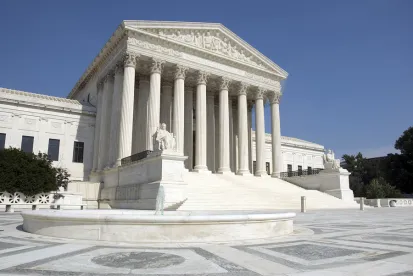In Oneok, Inc. v. Learjet, Inc., No. 13-271 (April 21, 2015), the U.S. Supreme Court held in a 7-2 opinion that state law antitrust claims against defendant natural gas pipeline companies did not fall within the field of matters preempted by the Natural Gas Act (the “NGA”), 15 U.S.C. § 717 et seq., even though the claims challenged industry practices bearing on the setting of wholesale natural gas rates—an area traditionally recognized as squarely within the NGA’s exclusive jurisdictional scope. This decision has implications reaching far beyond the litigation itself. Oneok opens the door to new, but yet unknown, state-level antitrust regulation of the wholesale natural gas market, and the uncertainty that will follow. As antitrust enforcement can vary by state, Oneok also subjects natural gas pipeline companies to potentially conflicting regulations and increased compliance costs.
The NGA’s express jurisdictional scope extends to “the sale in interstate commerce of natural gas for resale for ultimate public consumption . . . and to [the] natural gas companies” engaged in such sales. 15 U.S.C. § 717(b). By this language, the NGA establishes federal authority to regulate wholesale natural gas sales (known in industry parlance as “jurisdictional sales”) and the interstate pipeline company wholesalers (“jurisdictional sellers”). It had been generally accepted that, by the NGA, Congress also implicitly occupied the “field,” giving the federal government exclusive control over the wholesale natural gas market. Notably, the NGA does not purport to regulate natural gas sales outside its jurisdictional scope, including retail sales by pipeline companies to end-users.
The NGA also grants the Federal Energy Regulatory Commission (“FERC”) authority to ensure that rates for jurisdictional sales, or practices affecting such rates, are reasonable. Although, at one time, FERC used this authority to actually set wholesale rates, a period of de-regulation resulted in FERC allowing jurisdictional sellers to charge market-based rates for natural gas, subject to FERC oversight. During this period, sellers and buyers began to rely on privately-published rate indices (purporting to compile transaction data in markets across the country) to set the price terms for natural gas contracts at both the wholesale and retail levels. In 2003, however, FERC deemed the indices inaccurate because traders supplying information to the publishers either fabricated data or engaged in “wash trades” or other practices to manipulate index rates, which in turn inflated both jurisdictional sales (interstate pipeline sales to resellers) and non-jurisdictional retail sales. FERC issued regulations to prohibit the practices in question.
In Oneok, plaintiffs, large commercial and industrial end-users who purchased natural gas directly from pipeline companies in retail-level transactions, sued the companies in several state courts under state antitrust laws alleging that defendants had acted in concert to manipulate the natural gas indices, inflate retail prices, and overcharge plaintiffs. The defendants removed the actions to federal district court, where, after consolidation, the district court dismissed the claims as preempted by the NGA because the claims challenged practices directly affecting wholesale jurisdictional rates (not just retail rates) and, hence, sought to regulate in the federal field. The Ninth Circuit, however, reversed, finding the type of transactions in which the alleged harm occurred—i.e., transactions at the retail level—determinative of the preemption question.
The U.S. Supreme Court affirmed. It emphasized the NGA’s legislative history, which showed Congress “meticulous[ly]” preserving state power outside the NGA’s jurisdictional scope. According to the Court, this warranted judicial caution when making NGA field preemption determinations where the state law at issue applies to both non-jurisdictional and jurisdictional transaction-related conduct. Examining its prior NGA “field” preemption precedents, the Court identified the key determinant to be “the target at which the state law aims” and stated: “[T]he proper test for purposes of pre-emption in the natural gas context is whether the challenged [state law] measures are ‘aimed at [jurisdictional sellers and sales] or not.’”
In applying this test, the Court observed that the states aimed their antitrust laws not at pipeline companies but at all businesses in the marketplace. The Court also noted that the plaintiffs also sought foremost to direct their lawsuits at practices affecting non-jurisdictional retail rates, the cause of their alleged injury. Moreover, according to the Court, these lawsuits did not challenge the reasonableness of any wholesale rates, just “background marketplace conditions’’ affecting both wholesale and retail rates. It held that the NGA therefore did not preempt plaintiffs’ state law claims.
In the end, the majority opinion finds that the NGA tolerates state laws that aim at retail-level effects. But as Justice Scalia’s dissent points out, the NGA gives FERC power to regulate not particular “effects” but particular “subjects,” including the rate-index manipulation practices at issue. As these practices fall within the NGA’s jurisdictional scope (confirmed by FERC’s regulating in the field following its detection of the manipulation), Justice Scalia insisted that no other considerations should have weighed against field preemption.
Oneok’s holding may have significant consequences for the natural gas industry beyond the litigation itself. Notions of what practices constitute anticompetitive behavior and enforcement priorities can vary by state and change over time. Oneok’s holding invites ever-changing, non-uniform, and ad hoc application of state antitrust laws to jurisdictional-related practices whenever those practices affect non-jurisdictional retail sales. Allowing state-law to encroach upon jurisdictional sellers and sales in this manner adds enormous new regulatory uncertainty. As the dissenting opinion notes, this uncertainty extends to the Supreme Court itself, as the Court’s creative departure from precedent in Oneok likely signals further future but unknown departures, removing “any stable background against which to carry on the natural gas trade.”



 />i
/>i

